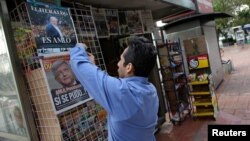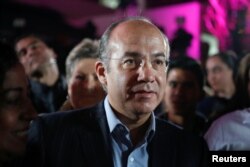To supporters, Mexico's incoming president, Andres Manuel Lopez Obrador, is the person best suited to tackle the country's notorious corruption, drug violence, income inequality and bring about institutional change. To detractors, including some of the country's business and political elite, he is "the most dangerous man in Mexico" and is not to be trusted.
Lopez Obrador, known by his initials AMLO, was elected Sunday with more than half the vote. He will become Mexico's first leftist president in decades when he takes office in December.
Rise of 'AMLO'
At 64, Lopez Obrador has been a mainstay of Mexican politics. As a young man, he was a member of the center-right Institutional Revolutionary Party, or PRI, which held hegemonic control of Mexico's government for eight decades.
Yet in the 1980s, as cracks were beginning to show in PRI's coalition, Lopez Obrador was one of the many leftist politicians to split from the PRI, joining the Party of the Democratic Revolution, or PRD.
In 2000, Lopez Obrador — still a member of PRD — was elected mayor of Mexico City, the nation's capital and most populated city. In this position, he gained national prominence, instituting social programs for the poor and elderly and improving the city's infrastructure.
After his mayoral term ended in 2005, Lopez Obrador sought higher office, making his first presidential bid the following year. For much of the race, he was considered the front-runner. Yet, Felipe Calderon of the right-leaning National Action Party, or PAN, narrowly defeated him, labeling the former mayor a socialist in the mold of then-Venezuelan President Hugo Chavez. The label stuck.
In 2012, Lopez Obrador ran for president a second time, but lost to now-outgoing President Enrique Pena Nieto, of PRI. Pena Nieto, proved unpopular; during his time in office, Mexico's murder rate swelled to an all-time high, the peso lost value, and Donald Trump was elected U.S. president. Trump has repeatedly used anti-Mexican rhetoric and pledged to build a wall between the two nations.
Mexico's constitution only permits presidents to serve one term; as such, Pena Nieto could not run in this year's election. Thus Lopez Obrador, now running on the newly-found National Regeneration Movement, (MORENA), was able to capitalize on this discontent with the country's status quo to finally claim the presidency.
AMLO as president
Lopez Obrador has long railed against what he calls the "power mafia," the country's economic and political ruling class, pledging to curtail their power. He has vowed to institute a slate of social programs to assist the poor, mirroring his actions as mayor. He is also described as a friend of Jeremy Corbyn, leader of Britain's Labor Party.
While left-leaning in his policy positions and rhetoric, Lopez Obrador has drawn comparisons to Trump; both portrayed themselves on the campaign trail as the only solution to a broken system; both were criticized for not being able to provide specific details on their policy proposals. Lopez Obrador's supporters say they hope he will be a more capable counter to Trump than Pena Nieto - who was accused of not standing up more to the American president.
"Congratulations to Andres Manuel Lopez Obrador on becoming the next President of Mexico," Trump tweeted Sunday night. "I look very much forward to working with him. There is much to be done that will benefit both the United States and Mexico!"
Lopez Obrador, for his part, has been quoted as saying, "We are never going to disrespect the U.S. government, because we want them to respect us." He also said: "At the appropriate moment, we are going to get in touch, to reach an understanding" with the Trump administration.
Like Trump, Lopez Obrador has also called for the renegotiating of the North American Free Trade Agreement, known as NAFTA — a trade agreement among Mexico, the U.S. and Canada.
"Today AMLO is a much more moderate, centrist politician who will govern the business community with the right hand, and the social sectors and programs with the left," Antonio Sola, a political consultant who worked on Calderon's 2006 campaign, told The New York Times.










